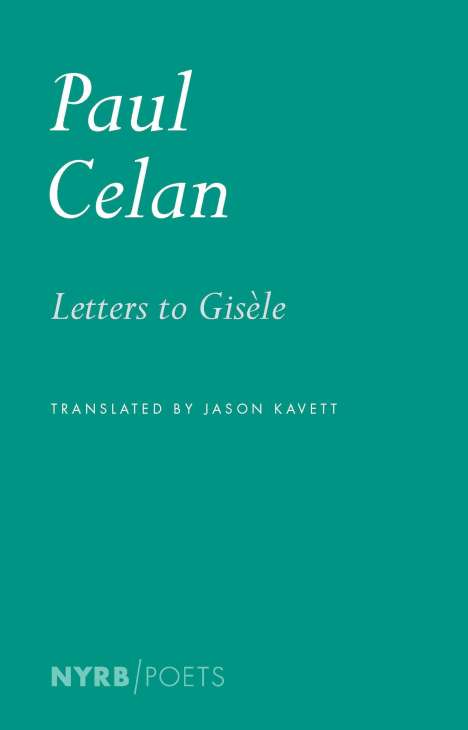Paul Celan: Letters to Gisèle, Kartoniert / Broschiert
Letters to Gisèle
- 19511970
(soweit verfügbar beim Lieferanten)
- Herausgeber:
- Bertrand Badiou
- Übersetzung:
- Jason Kavett
- Verlag:
- New York Review of Books, 12/2024
- Einband:
- Kartoniert / Broschiert
- Sprache:
- Englisch
- ISBN-13:
- 9781681378305
- Artikelnummer:
- 11582360
- Umfang:
- 544 Seiten
- Gewicht:
- 367 g
- Maße:
- 208 x 145 mm
- Stärke:
- 33 mm
- Erscheinungstermin:
- 10.12.2024
- Hinweis
-
Achtung: Artikel ist nicht in deutscher Sprache!
Klappentext
"Insightful and provocative letters by a great twentieth-century poet to his artist wife about life and, revealingly, his own writing. An intimate look at this canonical poet's process, mental health, and quotidian moments during the early 1950s. Paul Celan, a Jewish poet born in the Bukovina, now part of Romania, who survived the Nazi genocide and moved to Paris while continuing to write in German, is recognized as one of the most powerful poetic imaginations of the second half of the twentieth century. His work, a touchstone not only for poets but for historians and philosophers, has been translated into countless languages. The letters he wrote to his wife, the artist Gisáele Lestrange, now published for the first time in English, provide the best picture we have of Celan's complicated personality and the course of his life, both private and public. The life was troubled by paranoid episodes and repeated mental breakdowns ending in hospitalization, and in 1970 he committed suicide. At the same time, his devotion to his work as a poet and translator (of Shakespeare, Dickinson, and Mandelstam, among others) was unflagging. This selection of his letters to Gisáele, which also includes his letters to his young son, Eric, as well as significant number of Gisáele's own letters, covers almost all of his literary career, and while it is a personal document, offering a remarkable protrait of a great poet, a tender husband and father, and a difficult but enduring marriage, it is also a poetic one, providing Celan's translations for Gisáele of his poems from German into French and his extensive commentaries on them. It takes us to Celan's work desk, capturing him in the act of composition while also giving us Celan's reading of Celan. Bertrand Badiou's notes transmit precious information about Celan's work and life. The volume also includes photographs and a detailed chronology of the poet's life"--
Biografie (Paul Celan)
Paul Celan wurde am 23. November 1920 als Paul Antschel als einziger Sohn deutschsprachiger, jüdischer Eltern im damals rumänischen Czernowitz geboren. Nach dem Abitur 1938 begann er ein Medizinstudium in Tours/Frankreich, kehrte jedoch ein Jahr später nach Rumänien, zurück, um dort Romanistik zu studieren. 1942 wurden Celans Eltern deportiert. Im Herbst desselben Jahres starb sein Vater in einem Lager an Typhus, seine Mutter wurde erschossen. Von 1942 bis 1944 musste Celan in verschiedenen rumänischen Arbeitslagern Zwangsarbeit leisten. Von 1945 bis 1947 arbeitete er als Lektor und Übersetzer in Bukarest, erste Gedichte wurden publiziert. Im Juli 1948 zog er nach Paris, wo er bis zum seinem Tod lebte. Im selben Jahr begegnete Celan Ingeborg Bachmann. Dass Ingeborg Bachmann und Paul Celan Ende der vierziger Jahre und Anfang der fünfziger Jahre ein Liebesverhältnis verband, das im Oktober 1957 bis Mai 1958 wieder aufgenommen wurde, wird den posthum veröffentlichten Briefwechsel Herzzeit zwischen den beiden bestätigt. November 1951 lernte Celan in Paris die Künstlerin Gisèle de Lestrange kennen, die er ein Jahr später heiratete. 1955 kam ihr gemeinsamer Sohn Eric zur Welt. Im Frühjahr 1970 nahm sich Celan in der Seine das Leben
